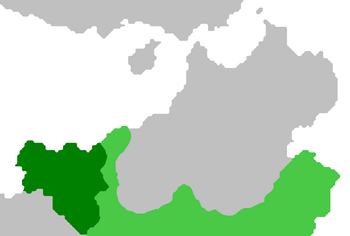Liplisqués Government
Grand Duchy of Ruttland Ruttųijos Didžioji Kunigaikštystė | |||||||||
|---|---|---|---|---|---|---|---|---|---|
| 1929–1933 | |||||||||
| Anthem: O, brangioji giraitės medis (de jure) Žygiuoja kareiviai (de facto) | |||||||||
 Dark green - Territory under republic's control Light green - Territory occupied by Gaullica | |||||||||
| Status | Puppet state of Gaullica | ||||||||
| Capital | Lipliškės | ||||||||
| Common languages | Ruttish | ||||||||
| Religion | Solarian Catholic | ||||||||
| Government | One-party dictatorship under a constitutional monarchy [note 1] | ||||||||
| Grand Duchess | |||||||||
• 1930-1933 | Elžbieta III | ||||||||
| Tautos Vadas | |||||||||
• 1929-1934 | Zydrunas Biržiška | ||||||||
| Legislature | Seimas | ||||||||
| History | |||||||||
• Establishment | 18th June 1929 | ||||||||
• Fall of Lipliškės | 4th May 1933 | ||||||||
• Formal abolition | 17th June 1933 | ||||||||
| Currency | Denier | ||||||||
| |||||||||
The Grand Duchy of Ruttland (Ruttish: Ruttųijos Didžioji Kunigaikštystė; Gaullican: Grand-duché de Ruterre) more commonly known as the Lipliškės Government (Lipliškės Vyriausybė; gouvernement de Lipliškės) was a Great War puppet state established in modern day Ruttland and western Cislania in Werania. Based around the city of Lipliškės it was declared by Ruttish nationalists led by Zydrunas Biržiška in June 1929 with the support of Gaullica following their invasion of Werania.
The state was governed by the National Resurrection Party (TPP), initially a moderate nationalist party but which soon became dominated by functionalists. The new regime targeted ethnic Weranics, Amendists and other opponents of the regime in what was considered large scale massacres. Due to historical cordial ties with Ruttland and Gaullica the grand duchy was afforded special privileges and operated as a largely independent state.
The state was reliant on Gaullica, with plans being drafted to announce a monarchy under Élisabeth, Duchesse de Maredoux who would become Grand Duchess Elžbieta III. However the country was dominated by Biržiška who as tautos vadas (national chief) and leader of the TPP ran Ruttland as a de facto dictator. Élisabeth never moved from Gaullica to Ruttland to be enthroned making the monarchical status of the state nominal.
The government fell after Lipliškės was captured by Kirenian-Weranian forces after a short siege in May 1933. The government remained in de jure existence for a short time afterwards until Biržiška was captured and killed by leftist partisans after which it ceased to de facto exist. The Grand Duchy was never formally abolished although Gaullica ceased recognising it's diplomatic staff in June 1933. As Élisabeth never took the throne she never formally issued an abdication or revocation of the title of Grand Duchess.
The Lipliškės Government was only recognised by Gaullica, other members of the Entente (such as Amathia and Shangea) as well as a handful of neutral nations. However following the war's end it was declared by the Weranian government that the Grand Duchy was not a legitimate state and was rather "an appendage to Gaullican military occupation". The legacy of the Lipliškės government continues to be subject to controversy in Ruttland, especially its relationship to Ruttish nationalism.
- ↑ Although formally declared as a monarchy Élisabeth, Duchesse de Maredoux was never enthroned during the states existence.

